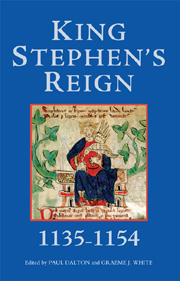Book contents
- Frontmatter
- Contents
- List of Maps
- Preface
- Abbreviations
- Genealogical Table
- Introduction
- 1 Henry I and the Origins of the Civil War
- 2 Royal Income and Regional Trends
- 3 King Stephen and Northern France
- 4 A Week in Politics: Oxford, late July 1141
- 5 Allegiance and Intelligence in King Stephen's Reign
- 6 English Monasteries and the Continent in the Reign of King Stephen
- 7 Reeds Shaken by the Wind? Bishops in Local and Regional Politics in King Stephen's Reign
- 8 Violent Disorder in King Stephen's England: A Maximum Argument
- 9 The Lure of Stephen's England: Tenserie, Flemings and a Crisis of Circumstance
- 10 Legal Treatises as Perceptions of Law in Stephen's Reign
- Index
9 - The Lure of Stephen's England: Tenserie, Flemings and a Crisis of Circumstance
Published online by Cambridge University Press: 12 September 2012
- Frontmatter
- Contents
- List of Maps
- Preface
- Abbreviations
- Genealogical Table
- Introduction
- 1 Henry I and the Origins of the Civil War
- 2 Royal Income and Regional Trends
- 3 King Stephen and Northern France
- 4 A Week in Politics: Oxford, late July 1141
- 5 Allegiance and Intelligence in King Stephen's Reign
- 6 English Monasteries and the Continent in the Reign of King Stephen
- 7 Reeds Shaken by the Wind? Bishops in Local and Regional Politics in King Stephen's Reign
- 8 Violent Disorder in King Stephen's England: A Maximum Argument
- 9 The Lure of Stephen's England: Tenserie, Flemings and a Crisis of Circumstance
- 10 Legal Treatises as Perceptions of Law in Stephen's Reign
- Index
Summary
To the memory of Pierre Bonnassie
A FEW YEARS after the ‘sedition between King Stephen and Duke Henry for acquiring the kingdom’, as he called it, a monk of Abingdon recalled that a constable of Wallingford, having promised to protect the monks in return for a payment by Abbot Ingulf (1130–58), had reneged and plundered the monastic vill of Culham. When the Abbot humbly sought restitution, he was rebuffed, and it was only when the constable was mortally wounded and needed release from ecclesiastical anathema that his brother promised to return the plunder – and in the end that promise, too, was compromised.
This sort of ‘protection-money’ had its own name – tenseria – during the reign of Stephen. Although this term itself is lacking in the Abingdon account, John Horace Round rightly cited this case in his brief study of ‘Tenserie’ published more than a century ago. For indeed, when allusions to coercive payments and intimidation are added to the comparatively few mentions of tenseria as such, the implications of a form of violence with its own vocabulary are considerably enlarged. They open two perspectives of research: that of the nature and origin of tenseria, and that of the nature of violence in a society often described as suffering from ‘anarchy’. The first and smaller of these perspectives is what chiefly concerns me in these pages, but I wish to say at once that nothing in what follows is meant to argue that anarchy prevailed under King Stephen.
- Type
- Chapter
- Information
- King Stephen's Reign (1135–1154) , pp. 171 - 181Publisher: Boydell & BrewerPrint publication year: 2008

